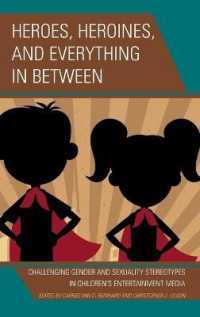- ホーム
- > 洋書
- > 英文書
- > Psychology
Full Description
Watching people protest, one hypothesis is that underlying these actions for specific justifiable causes is a sense of wishing to belong, of wishing not to be alone. Recent knowledge from patients and empirical research shows the importance of belonging to groups to both psychological and physical well-being. The problems of many students, minority group members, immigrants, terrorists, and lonely people are linked to an insufficient sense of belonging. Whereas psychoanalytic theory has focused on the need for a secure attachment to a primary caretaker, it has failed to note the importance of a sense of belonging to the family group, a friendship group, a community, a religious group, a nation-state, etc.
This book demonstrates the difficulties faced by those who immigrate, those who never feel a sense of their true selves as belonging in a family or a cohesive professional group, and the difficulties of psychoanalysts themselves in knowing where they belong in patients' lives. The problems of breaking up marital and professional relationships as well as our relationship with the Earth are also discussed.
Freudian theory rejected the idea of a sense of "oneness" with humanity as being infantile. Recent developments regarding the similarities between meditational practices and psychoanalysis have questioned Freud's idea. This book shows the importance of an interpersonal/relational psychoanalysis focusing on real relationships and not simply one that examines inner conflicts. It will be useful to psychologists, other mental health practitioners, social scientists, and anyone with normal struggles in life.
Contents
Chapter 1: Introduction: You are Not Alone . . . Part 1: Belonging and Immigration Chapter 2 Two Immigrants' Search to Find Home . . . Chapter 3 Self-fragmentation in Relation to the Need for Belonging in the Context of Adoption and Immigration. . . . Chapter 4 Identity Struggles: A Psychotherapist Working on An International Visa . . . Part 2: Belonging and Loneliness Chapter 5 Loneliness and Belonging: Islamic Terrorism. . Chapter 6 The Origins of Terrorism: The Obliteration of a Sense of Belonging. . . Chapter 7 The Unbearable Transience of Belonging. . . Part 3: Groups, Culture, and the Environment Chapter 8 Birnam Wood. . . . Chapter 9 From Attachment to Detachment: The Transformation of "Belonging" in the Kibbutz. . . Chapter 10 Belonging: The Conundrum of Interfaith Marriage. . . Chapter 11 Secure Uncoupling: A Proposed Theory of Belonging After Divorce. . . .Chapter 12: Belonging to an Awakening: The Analytic Function of Witnessing Applied to the Climate Emergency. . . Part 4: Belonging and Mindfulness Chapter 13: Where Does a Discussion of Buddhism Belong in Psychoanalysis?. . .Chapter 14: Beyond Belonging. . . Part 5: Belonging and Self-Organization Chapter 15: (Not) Belonging in One's Own Skin: Stumbling into the Space Between Obsessions. . . Chapter 16: Confusion of Belongings: Ms. F. in Search of True Belonging. . . Chapter 17: Belonging To, Belonging With, and the Right to Privacy. . .Part 6: Belonging. The Psychoanalyst, and the Psychoanalytic Process. . . Chapter 18: Belonging and Not Belonging: The Analyst's Peculiar Paradox. . . Chapter 19: Psychoanalysis and the Disavowal of Classism . . . Chapter 20: To Belong Broadly or Affiliate Narrowly? Psychoanalysis' Pluralism Problem. . . Chapter 21: Belonging and Choosing Not to Belong to a Psychoanalytic Society. . . Part 7 Conclusions Chapter 22: Reflections, Discussion and Conclusions: From Primary Attachment to an Individual To Belonging to a Greater Whole.







